
Page 2
| Parent | Educational System in Japan |
|---|---|
| Date | 13 March 1947 |
| Language | English |
| Collection | Tavenner Papers & IMTFE Official Records |
| Box | Box 4 |
| Folder | General Reports and Memoranda from March 1947 |
| Repository | University of Virginia Law Library |
FSTavenner 13 Mar #2
Documents 531 A to F. These documents contain excerpts from speeches held at the Seventh Conference of the World Federation of Education Associations, held in Tokyo in 1997. Representatives of various countries exchanged compliments with the representatives of Japan. All this is entirely irrelevant and the document should not be admitted.
Document 268 - Excerpt from a book entitled "Youth and Culture", written by Araki. In this excerpt Araki stresses the principle of Knightly Benevolence and dwells on the merits of the Bushido Spirit. The document gives no facts and its only merit is that it may contain Araki's views on the Bushido teachings.
The above list contains four affidavits and there will therefore be ample occasion for the Prosecution to cross examine on the subject of education.
The following is a short survey of the Japanese educational system* If necessary, I can also draw up a list of speoific points for cross examination but this will take another day*
General militaristic and aggressive tendencies in Japanese education:
All Japanese education was under direct supervision of the central government. School curricula were the same throughout the country. There was no choice of subjects, everybody had to attend the same classes. (Defense document 439, p 4).
Text books used in primary and presumably also middle schools were prepared by the Education Ministry and were the same throughout the country. Special compilers of text books were employed in the Education Ministry and in this manner text books could constantly be revised or rewritten in accordance with the government's policy. (Defense documents 439, pp 10 and 11) Record p 869).
Japanese education has been on a militaristic basis ever since the Meiji Era. The Imperial Rescript on education issued by the Emperor Meiji states that children should be taught to offer themselves courageously to the state. (Exhibit 139). This in itself does not mean much but gave a basis for the teaching of a militaristic and nationalistic spirit in later years. (Direct and cross examination of witness OUCHI, Record pp 943, 944, 978, 979; Direct examination of witness KAIGO, Record p 881). Although the rescript was not written in an inflammatory spirit it has been used to mean something else than was written.
7.
In 1925 regular army officers in active service were attached to all schools in Japan except universities for the purpose of giving military training. (Later reference is made to this.) In the beginning these army officers seem to have had no direct influence on the teaching of other subjects but this changed after the out¬break of the Manchurian Incident. Lectures given by these officers began to stress that Japanese were superior to the other races, that war was productive and that it was Japan's destiny to rule the Far East, and thereafter the whole world. Gradually other teachers in the schools were required to cooperate in this program and failure
